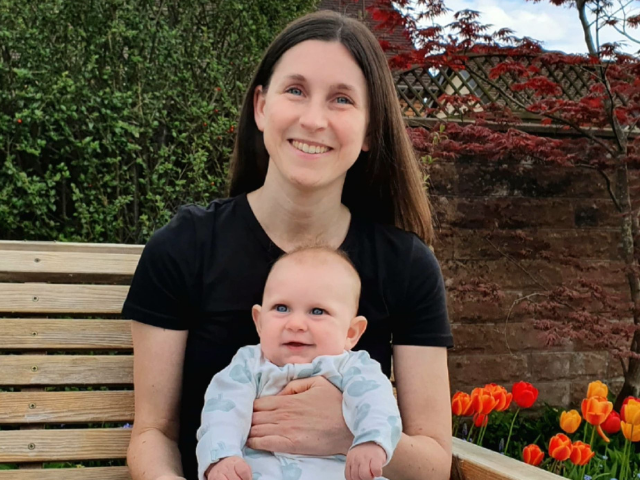
Reducing major bleeding after childbirth in Wales thanks to life-saving research
4 May
A Welsh health improvement project which has resulted in 160 women per year avoiding the need for a blood transfusion after giving birth has changed postpartum haemorrhage guidelines in Wales.
For International Day of the Midwife (May 5) we’re highlighting the vital role of research in improving midwifery practice. The Obstetric Bleeding Strategy (OBS) Cymru project was an improvement programme from 2016-2019 based on the results of the OBS2 study, led by Professor Peter Collins, and run by the Centre for Trials Research, part of the Health and Care Research Wales funded community.
OBS Cymru aimed to reduce harm from postpartum haemorrhage through the use of a new checklist requiring midwives to measure blood loss throughout childbirth by weighing the amount of blood on a patient’s sheets and in collection containers. This process means midwives know as soon as a patient is bleeding abnormally, enabling early interventions to prevent the need for a blood transfusion. Before this, blood loss wasn’t measured consistently in Wales.
Due to its success, OBS Cymru has been adopted into the All Wales Postpartum Haemorrhage Guidelines. Midwives, obstetricians, anaesthetists, haematologists, and health care assistants throughout health boards now follow the same process for management of blood loss during childbirth. In 2021, OBS Cymru was given the Health and Care Research Wales Research Impact Award.
Dr Sarah Bell, consultant anaesthetist at Cardiff and Vale University Health Board, who is leading on this work, said:
“The OBS Cymru project is the result of ten years of research into the best ways to identify and treat major bleeding after childbirth. We know patients in Wales are benefitting from this change in practice and through further research we hope to change future postpartum haemorrhage guidelines across the UK so that this approach can benefit all women.”
Maryanne Bray, Lead Research Midwife at Cardiff and Vale University Health Board, said:
“Research into interventions like this is so important because it shows how small changes in our processes can have a big impact. What we do as a maternity team can affect a mum and her baby for the rest of their lives so it’s important that we get it right. I believe there is still so much we can do to improve care and outcomes for women in the future and research is the answer.”
Sarah Milosevic, 35, is from Llangattock and experienced a major haemorrhage with her first baby in November 2021.
Sarah said: “I saw an advert on the Health and Care Research Wales website asking for people with experience of postpartum haemorrhage to help plan further research into the effectiveness of OBS Cymru. I believe maternity research is vitally important, and as the discussions were online it was easy to take part with a small baby!
“Even though I had severe bleeding when I gave birth to my son it was clear the midwives and doctors knew exactly what they were doing and I felt like I was in safe hands. However, I know this isn’t the same for every mum, and that postpartum haemorrhage can be a really difficult experience. I wanted to give feedback so that I could help contribute to the improvement of maternity care throughout the UK.”
Charlene Jones, 42, is from Neath and had a major haemorrhage after giving birth to her twin daughters in February 2020.
Charlene said: “After my daughters were born, my partner noticed that I was losing a lot of blood. Even though it was quite scary for us, the midwife reacted quickly, alerting the obstetric team. I saw them weighing my bed sheets to find out how much blood I’d lost, which I’ve learned is because of OBS Cymru.
“Everyone knew what they were doing and the midwife communicated with me clearly about what was happening. Considering how frightening the situation was, I feel I was given excellent care and I think that is thanks to OBS Cymru. It makes me really proud that Welsh research is leading the way in improving treatment for postpartum haemorrhage.”
Speaking on International Day of the Midwife 2022, Professor Julia Sanders, Specialty Lead for Reproductive Health at Health and Care Research Wales, said:
“Major bleeding is one of the most common complications experienced by women during childbirth, and faced by midwives and obstetricians. The OBS Cymru project has improved the management of postpartum haemorrhage in maternity units throughout Wales, resulting in better outcomes for the women in our care.
“Although the OBS Cymru approach to postpartum haemorrhage has been shown to work in Wales, guidance and practice still differs across the UK. To get the strong evidence needed to support the OBS Cymru approach, research is now required on a larger scale involving the other UK nations. An application for this larger study has been developed and I am hopeful it will be funded. I’m so proud of developments like this which show how the multidisciplinary maternity teams in Wales work together to develop and test pioneering improvements to maternity care and midwifery practice.”
Find out more about how Welsh research midwives are paving the way to best practice.
Watch consultant anaesthetist, Dr Sarah Bell, talk about the OBS Cymru project.